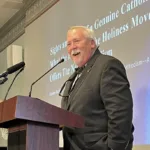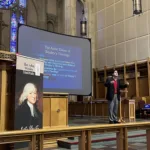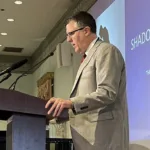By Alan F.H. Wisdom (@afhwisdom)
“The issue of the time is how much [economic] inequality is tolerable.” So declared the Rev. Christian Iosso, Coordinator of the Presbyterian Church (U.S.A.) Advisory Committee on Social Witness Policy (ACSWP), at the conclusion of a workshop on “Raising Taxes and Raising Crops.” The workshop, part of the April 5 “Food Justice” conference, was also billed as a report from an ACSWP team commissioned by the 2012 PCUSA General Assembly to study the U.S. tax system.
Iosso’s take on the issue was that, at minimum, current levels of inequality were intolerable. “We’re all experiencing, like the frog in the hot pot, this crazy imbalance of where the money is going in society,” he asserted. “The culture of greed has gone too far.”
The ACSWP coordinator was grim about the state of the U.S. economy and society. “We see the young who have no clear career paths open anymore,” he said. “In a society where there’s no hope of economic mobility for many people, then there becomes a lot of corruption, a lot of cheating.”
In the face of such economic and moral crises, the solution favored throughout the workshop was to raise taxes on the rich. To make this argument, Iosso introduced Dr. Edith Rasell, an economist who holds the position of Minister for Economic Justice in the United Church of Christ (UCC). Rasell, who is also a member of the PCUSA team studying tax policy, asked and answered the question, “Why is progressivity [higher tax rates on higher incomes] better?”
Rasell remarked that “we all owe to society” for the “social capital”—infrastructure, knowledge, patterns of cooperative action—that has been built up over the generations. Those who “have a lot of money” have benefited more and therefore “can afford to pay more.” Her assumption was that government was the main source of this social capital, and paying taxes to the government was the main way to settle the debt that “we all owe to society.” The UCC economist saw government as entitled not only to extract a proportionate share of everyone’s income, but also to impose higher tax rates on the wealthy to redistribute their income to others.
“The federal income tax, despite all its flaws, is the most progressive tax we have,” Rasell stressed, “and never let it be done away with.” Iosso suggested that the income tax could be made still more progressive by going after funds that the wealthy had stashed in overseas accounts. “What if the tax haven stuff reveals that the [top] one percent really do have a spectacular amount that they’re tapped into?” he asked. “Then taxing them more adequately really does yield a surprising amount.”
Rasell handed out and shared snippets from a paper she had written for the UCC on “The Tax System: A Matter of Faith, Fairness, and Flourishing Communities.” In the paper she locates the “theological and biblical foundations” of modern fiscal policy in various scriptural admonitions addressed to the early Church: the Great Commandment to “love your neighbor as yourself” (Matt. 22:39); Jesus’ warning that all will be judged by how they treat the stranger in need (Matt. 25:31-46); and Paul’s appeal to the Corinthian Christians to send relief to their impoverished brethren in Jerusalem (2 Cor. 8:1-15).
“We are called to generosity and we need not fear scarcity,” Rasell states in the paper. She sees this theological principle embodied in today’s welfare state: “In a modern society caring and sharing occur in many ways including, very importantly, through a system of progressive taxation that pays for a social safety net, the universal provision of public services, and opportunities for all.” In the UCC official’s view, apparently, paying taxes counts as “generosity” and government entitlement programs are the fulfillment of the command to love one’s neighbor. She refuses to acknowledge any “scarcity” that might limit the scope of taxes that the government collects or benefits that it dispenses.
Rasell looks to the state to solve almost all social problems: “In a nation of 310 million people and a world of over six billion, only government—of, for, and by the people—has the potential to raise sufficient resources and put in place the structures and institutions that can fill our unmet needs and provide for the common good.” Since the needs are great, she insists: “More revenue is needed; taxes must be raised.”
Rasell’s paper proposes to levy heavier taxes on capital gains, carried interest, estates of the deceased, and corporate profits. She backs a new tax on financial transactions and wants to recapture revenue now lost through tax deductions and credits. Nowhere does Rasell suggest any moves to lighten the burden of taxation. She never addresses the possibility that taxes might at some point become excessive, strangling economic initiative. The prophet Samuel warned the Israelites against a king who would “take one-tenth of your grain and of your vineyards and give it to his officers and courtiers” (1 Sam. 8:15). But in Rasell’s thinking there seems to be no upper limit to the share of wealth that the government can claim for itself.
If this is the direction in which the PCUSA tax policy study is pointed, it appeared to enjoy the enthusiastic support of the Presbyterian activists attending the April 5 workshop. When Rasell polled the roughly 20 audience members about whether they regarded their taxes as too high, too low, or about right, almost all responded that their taxes were too low and should be raised. The UCC official expressed surprise at this response, noting that other church audiences might have taken a different view on taxes.





Comment by Marco Bell on May 1, 2013 at 9:40 pm
Revenue IS needed!
And the wealth disparity is staggering.
Comment by Donnie on May 2, 2013 at 10:47 am
There is nothing stopping you from making a donation to the federal reserve.
Also, the bottom 47% pays nothing, while the top 25% pays 86% of taxes. Sounds pretty unfair to me.
Comment by skotiad on May 2, 2013 at 12:47 pm
If you feel your heart going out to those who have less than you, then the proper thing to do is give some of what you have to them, and there are many ways to do that. You do not have the obligation, nor even the right, to take from someone else’s pocket and pass it on to someone else, and the fact that you may fancy you’re acting in the interest of “fairness” is a moot point, since there is no objective measure of fairness and, rest assured, the people you take from will NOT see it as fairness. Liberalism is about A and B meeting together and deciding how much to force X to give to Z. That involves coercion, not compassion. Check out the Bible, where it says “God loves a cheerful giver.” Most taxpayers, myself included, are none too cheerful about supporting idlers who fancy they have a “right” to what the gainfully employed produce. They don’t. And meddling government bureaucrats have no business telling me what “fair” is, nor a bunch of left-wing “Christians” who produce nothing of value to society and like to tax those who do produce.
You say “Revenue IS needed!” I say, “Then give it–yourself!” If you feel undertaxed, write a whopping check to the US Treasury, I’m sure they won’t refuse it. What is mine is mine. taking it from me against my will is called “theft.” What is it about this that liberals cannot grasp?
Christianity and socialism are not the same. Christianity still takes the Ten Commandments at face value, and two of them are “Thou shalt not steal” and “Thou shalt not covet,” hence the exact reverse of socialism. Sorry to sound harsh, but I’m really sick of “compassionate” people who are motivated not by love of the poor but by the pleasure of manipulating other people’s finances. Put YOUR money where your mouth is, and leave other people’s alone. Do a Francis of Assisi and give everything you own to the poor – as if any liberal would dream of doing something so generous. Stop dwelling on income disparities unless you are willing to lower your own standard of living. Incidentally, surveys are pretty clear on this: conservatives give more to charities than liberals do – not just money, but time also. If you aren’t willing to walk the walk, the talk is pretty cheap.
Comment by Sandra K Jenner on May 2, 2013 at 6:55 am
“Taxes must be raised,” eh? Sounds like we’ve transitioned from “render unto Caesar what is Caesar’s” to “beg Caesar to oppress you even more.” thanks, but I’ll stick with Jesus on this one.
Who are these people, and why do they insist on placing the “Christian” stamp on their personal liberal opinions? How odd that the religious left, which has an epic hissyfit when orthodox Christians point out the “musts” in the Bible, have no qualms about telling us what “must” happen, based on their thinly disguised socialism.
The PUCSA and UCC would qualify as “failed businesses” based on their declining membership rolls. So why are the leaders of these failed businesses supposed to be experts on economic matters? They don’t seem too good at generating voluntary giving, so I guess they look to the coercive methods of the state as the solution.
Comment by ReformedCatholic (@ReformedCath) on May 3, 2013 at 2:47 pm
I’d rather see the denominations say that additional tithes and offerings are needed so that the churches can do what government can’t.
That said, this anything these mainline churches say now is so irrelevant that they’re just wasting air and paper.
Pingback by PCUSA workshop, study point toward higher taxes - The Layman Online - The Layman Online on May 6, 2013 at 9:53 am
[…] more at http://juicyecumenism.com/2013/05/01/pcusa-workshop-study-point-toward-higher-taxes/ Download this page in PDF […]